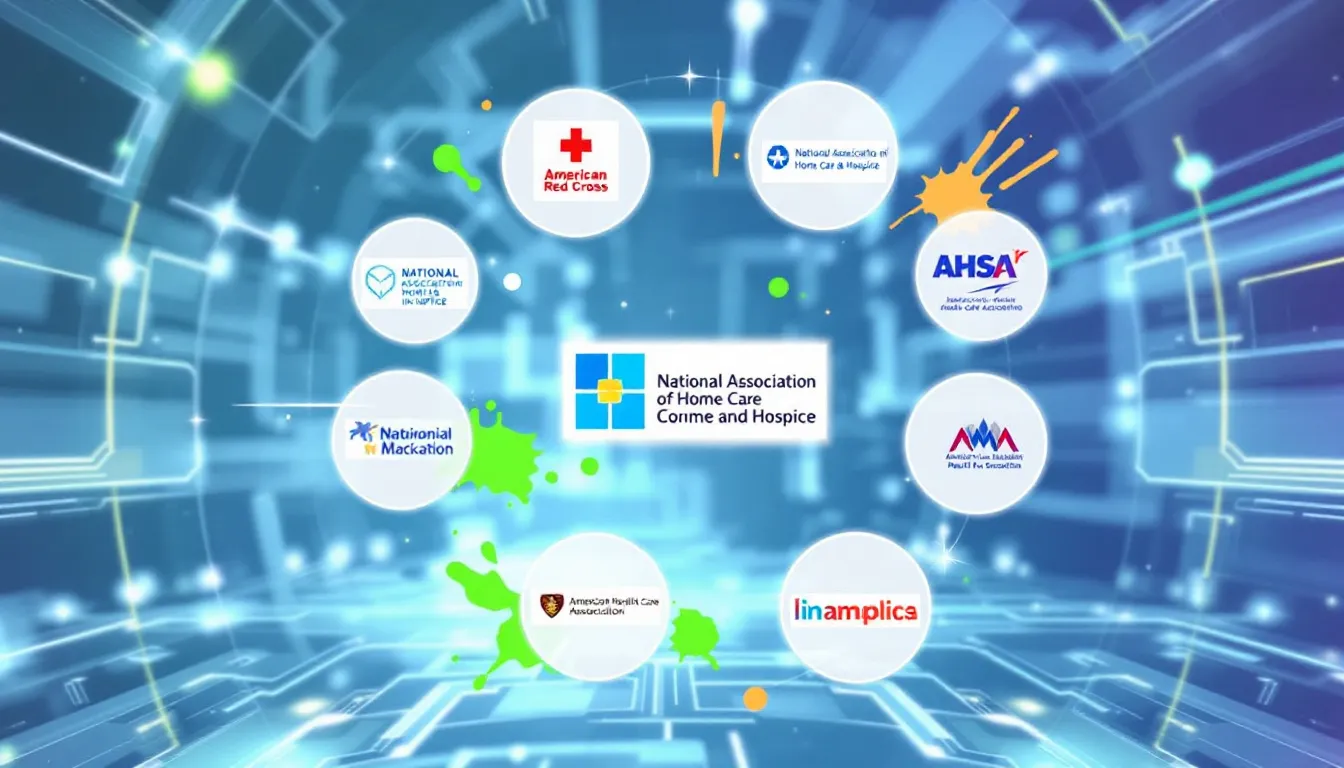Top Home Health Certification Online Programs | Best Training Options
Are you exploring home health certification online and wondering how to get certified from the comfort of your home? This article covers everything you need – from understanding what home health aide certification entails, to the best online programs available. Discover the benefits of online training, key program components, and the career opportunities that await certified home health aides.
Key Takeaways
- Home health aide certification requirements vary by state, focusing on equipping individuals with essential skills and knowledge for quality healthcare delivery.
- Online home health aide training provides flexibility, allowing students to complete their education at their own pace, often leading to faster entry into the workforce.
- Certification enhances job prospects for home health aides, with significant demand expected, providing a variety of career opportunities in different healthcare settings.
Understanding Home Health Aide Certification

Home health aide certification is a testament to one’s qualifications and skills necessary to provide quality care in the healthcare industry. It’s not just a piece of paper; it’s your ticket to a meaningful and impactful career. Earning HHA certification requires rigorous training and passing a certification exam.
The certification requirements are not uniform across the United States. They can differ from state to state, reflecting local regulations and demands. Aspiring HHAs must understand specific state requirements, but the core objective remains to equip them with essential skills and knowledge.
For many, the journey to becoming a certified home health aide is both challenging and rewarding. The certification process prepares aides to meet client needs in various settings, instilling confidence in both aides and the families they serve by ensuring high standards of care.
Benefits of Online Home Health Aide Training

Online home health aide training offers numerous benefits over traditional classroom settings, including the flexibility to learn at one’s own pace and manage time effectively. This is especially beneficial for those who may already be working or have other commitments, making home health aide online training an attractive option.
One of the standout advantages of online training courses is the elimination of travel time. Students can focus solely on their education from the comfort of their homes, saving both time and money. Online training often accelerates completion, allowing students to graduate and enter the workforce in as little as four months, making it an attractive option for many aspiring HHAs.
Moreover, online classes cater to a diverse range of students by removing prerequisites for enrollment, promoting inclusivity in education. Students benefit from immediate access to resources and support through digital platforms. These programs create a dynamic, interactive learning environment that fosters community and collaboration among peers, even virtually.
Key Components of Online HHA Training Programs
Online HHA training programs are designed to provide the essential skills and knowledge required for quality home healthcare, generally including a comprehensive curriculum, hands-on skills training, and thorough exam preparation.
These elements ensure students are well-prepared for their future roles as home health aides.
Curriculum Overview
The curriculum of online HHA training programs typically includes around 120 hours of classroom instruction along with 40 to 60 hours of practical experience. This blend of theoretical and practical education ensures that students are not only knowledgeable but also competent in applying their skills in real-world scenarios. Essential topics covered in the curriculum include client assistance, health monitoring, and basic emergency response.
The curriculum covers communication skills, vital signs monitoring, and emergency procedures, emphasizing personal care and emergency response to prepare students for diverse situations with confidence and expertise. By the end of the training, students have a solid foundation to build upon as they embark on their careers.
Hands-On Skills Training
Hands-on skills training is a critical component of home health aide training programs. It involves practical training components that include both online courses and in-person skill assessments. A common requirement is a practical skills review session lasting two hours, where students demonstrate proficiency in patient care techniques.
During these hands-on training sessions, students acquire training through activity handouts and skills checklists to aid their learning. This ensures they are both theoretically and practically competent in performing their duties.
The combination of online and in-person training helps students develop the necessary skills to provide high-quality care to their clients.
Certification Exam Preparation
Certification exam preparation is vital, with exams typically consisting of 100 questions covering ten essential topics for a comprehensive knowledge assessment. To pass the HHA knowledge exam, participants must achieve a minimum score of 80%.
Exam preparation often integrates theoretical and practical assessments, with some programs offering comprehensive packages including instructor materials and assessment tools. This thorough preparation ensures that students are well-equipped to succeed in the certification exam and embark on their careers as certified home health aides.
Top Online Home Health Aide Training Programs

Selecting the right training program is vital for aspiring home health aides. Many reputable institutions offer online programs that meet federal and state requirements and provide quality education.
In this section, we will explore some of the top online training options available, including Southern Technical Institute and CareAcademy.
Southern Technical Institute
Southern Technical Institute offers both online and in-class HHA training programs, providing flexibility for students. The typical online training consists of nine courses, culminating in a 40-hour externship, with a two-hour hands-on clinical skills competency review and practice. This approach ensures students gain both theoretical knowledge and practical experience.
Upon completing the training at Southern Technical Institute, students are awarded a 40-hour HHA certificate. Certified nursing assistants can earn a 75-hour HHA certificate through the online course. This flexibility makes Southern Technical Institute a popular choice for those looking to enter the home health aide field.
CareAcademy
CareAcademy emphasizes a hybrid model with over 75% of training conducted online. This approach combines the convenience of online learning with the essential hands-on practice. CareAcademy’s model features substantial online coursework, complemented by hands-on practice.
The program includes 16 hours dedicated to hands-on practical skills training. This ensures that students are well-prepared to assist clients with various needs, from basic daily living tasks to more complex care scenarios.
CareAcademy provides a complete training program for home health aides, making it a strong contender for those seeking a comprehensive education.
Other Notable Programs
Choosing a reputable online HHA training provider is crucial for ensuring quality education and career readiness. Provider 1 offers an interactive online learning platform that enhances student engagement through multimedia resources and support. This can be particularly beneficial for students who thrive in a visually and interactively rich learning environment.
Provider 2 is known for its personalized instruction, ensuring that each student’s learning needs are met through tailored coursework. Provider 3 provides robust career support services, while Provider 4 is recognized for its flexible scheduling tailored to adult learners.
These features position these providers as key players in HHA training.
Meeting Federal and State Requirements

Meeting federal and state requirements is essential for home health aides. The HHA program adheres to the CMS Conditions of Participation, ensuring compliance with federal regulations. Completion of the HHA program includes a knowledge exam that covers essential topics mandated by federal guidelines. This ensures that home health aides are well-prepared to meet the demands of their roles.
Certification requirements often vary by state and employer, especially for Medicare or Medicaid-funded positions. Programs like CareAcademy can be customized to meet specific state eligibility requirements.
Home health aides are also mandated to undergo a minimum of 12 hours of in-service training each year to maintain their certification, and record-keeping is essential for home health agencies to track in-service training completion for at least six years.
Career Opportunities for Certified Home Health Aides

Certification significantly enhances job prospects and advancement opportunities in healthcare, providing credibility and allowing aides to take on greater responsibilities and potentially earn higher salaries. The demand for home health aides is projected to grow significantly, with a 22% increase expected by 2032. This highlights the vast career opportunities available for certified home health aides.
Certified home health aides can work in various settings, including home health agencies, hospitals, and nursing homes, making it a versatile and rewarding career choice for those looking to impact lives meaningfully. Home health aides work in diverse environments, contributing to the well-being of their clients.
Whether working with chronic illnesses, providing companionship, or aiding in daily living activities, the role of a home health aide is both challenging and fulfilling.
Enhancing Your Skills and Continuing Education
Continuing education is essential for home health aides to keep up with evolving practices and regulations, with courses covering both fundamental and advanced topics like prescription management and advanced directives. Programs like CareAcademy combine online and in-person training to equip aides with essential skills in compliance with federal standards.
Professional organizations and online providers, such as the National Association of Health Care Assistants and CareAcademy, offer various in-service training programs for home health aides. Certified Home Health Aides can advance to become Certified Nursing Assistants, expanding their responsibilities and job settings.
Further education can lead to roles as Licensed Practical Nurses or Registered Nurses, taking on more complex care responsibilities. Skilled Home Health Aides can transition into Patient Care Coordinator roles, overseeing care plans and coordinating services.
Those interested in management can pursue careers in healthcare administration with additional education. HHAs can also consider roles as Occupational Therapy or Physical Therapy Assistants, aiding rehabilitation efforts. Some may choose to enter social work, helping families navigate healthcare and social resources.
Summary
In summary, obtaining a home health aide certification through online training programs offers numerous benefits, including flexibility, accessibility, and a comprehensive education. The key components of these programs ensure that students are well-prepared for their roles. By choosing reputable training providers and meeting federal and state requirements, aspiring HHAs can look forward to rewarding and diverse career opportunities. Embark on this fulfilling career path and make a difference in the lives of those in need.
Frequently Asked Questions
What are the key benefits of online home health aide training?
Online home health aide training provides flexibility and self-paced learning, allowing students to balance their studies with other commitments while accessing resources immediately. This convenience enhances the overall learning experience.
How long does it take to complete an online HHA training program?
It generally takes about four months to complete an online Home Health Aide (HHA) training program, though this can vary based on the provider and individual pace. Ultimately, your commitment will influence the duration of the training.
What topics are covered in the HHA training curriculum?
The HHA training curriculum covers client assistance, health monitoring, basic emergency response, communication skills, vital signs monitoring, and emergency protocols. This comprehensive approach ensures that trainees are well-prepared to provide quality care.
What is the practical component of HHA training programs?
The practical component of HHA training programs includes hands-on skills training, with a combination of online courses and in-person assessments to equip students for real-world application of their knowledge.
What career opportunities are available for certified home health aides?
Certified home health aides have a range of career opportunities in home health agencies, hospitals, and nursing homes, with potential for advancement and specialization in various healthcare fields.

